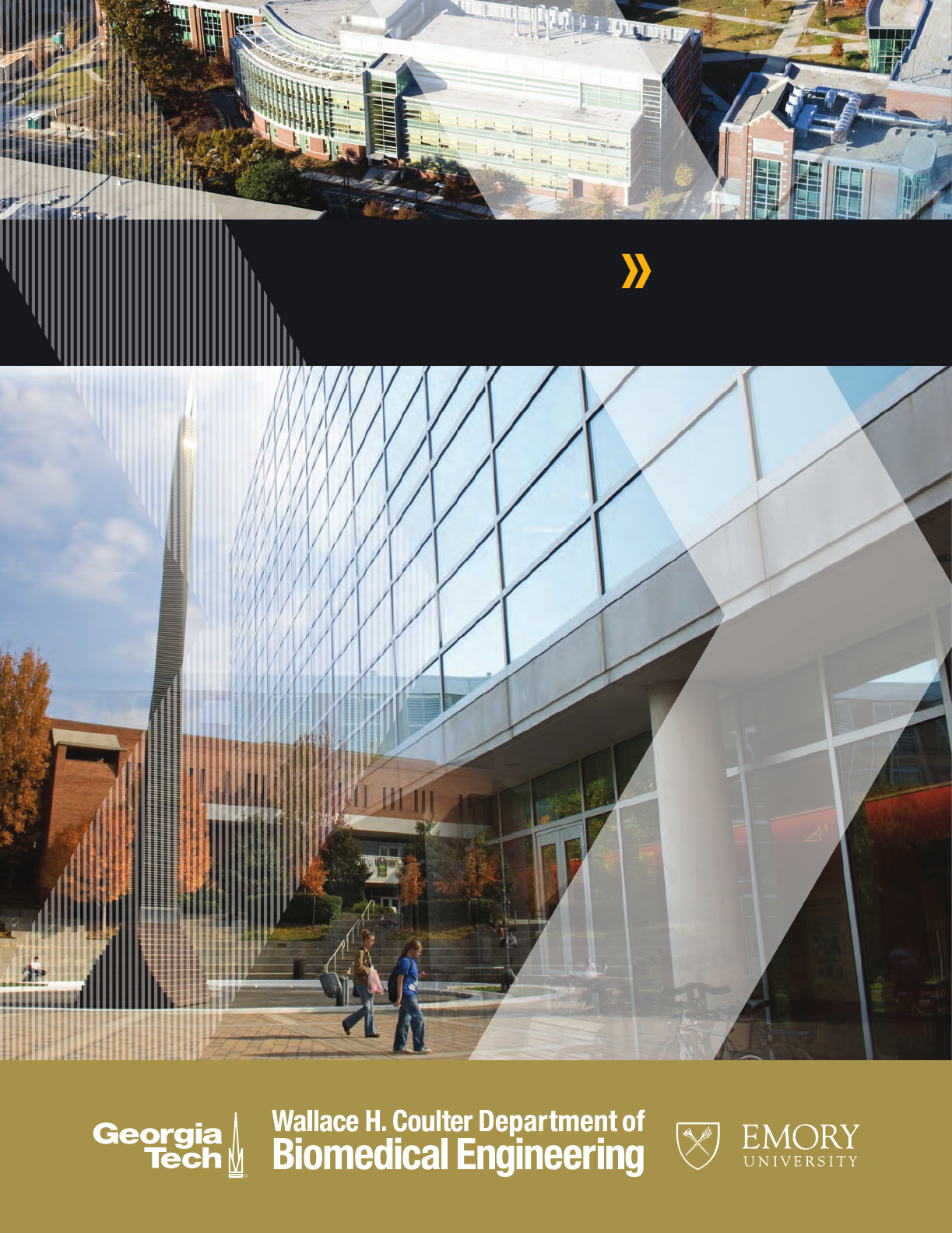
Recyclable
This publication is printed on paper that is produced
with recycled material. Georgia Tech is committed to
Copyright 2019 • Georgia Institute of Technology
MASTER OF
BIOMEDICAL ENGINEERING
Georgia Institute of Technology
BME Academic Oce
313 Ferst Drive, 1st Floor
Atlanta, Georgia 30332
www.bme.gatech.edu
•
Located in one of America’s most vibrant cities, Georgia Tech’s College of Engineering combines the
resources of a major university with the benets of an urban campus, giving students the tools they need
to chase their ambitions. With dozens of degree programs across eight schools, the College has built a
strong reputation in the United States and abroad, and graduates leave with skills, knowledge, and global
savvy for a world increasingly dependent on engineering.
Georgia Tech’s engineering graduate programs are consistently ranked in the top ten in the nation in their
respective specialties according to U.S. News & World Report graduate rankings of national universities
granting doctoral degrees.
The Wallace H. Coulter Department of Biomedical Engineering
at Georgia Tech and Emory University arms our institutions’
eorts to increase equity, diversity, and inclusion on our
campuses. We strive to create a welcoming, diverse and
inclusive environment that values, celebrates, and respects the
individual and communal dierences that make us human, and
aspire to cultivate global leaders in engineering and medicine
who are champions of inclusive excellence.
ATLANTA: A Thriving Metropolis
Atlanta is an integral and exciting aspect of the Georgia
Tech and Emory educational experience. Atlanta
is one of the Southeast’s most vibrant, progressive,
and dynamic cities. When students are not studying,
they explore Atlanta’s rich and diverse culture
through museums, music venues, professional sports
teams, shopping districts, and the best cuisine in the
south. Atlanta’s warm climate allows for year-round
outdoor activities. Mountains, lakes, campsites, and
hiking trails are all within an hour’s drive — and access
to Hartseld-Jackson Atlanta International Airport
makes the whole world just a ight away.
Located in Atlanta, the
Georgia Aquarium is the
world’s largest indoor
aquarium.
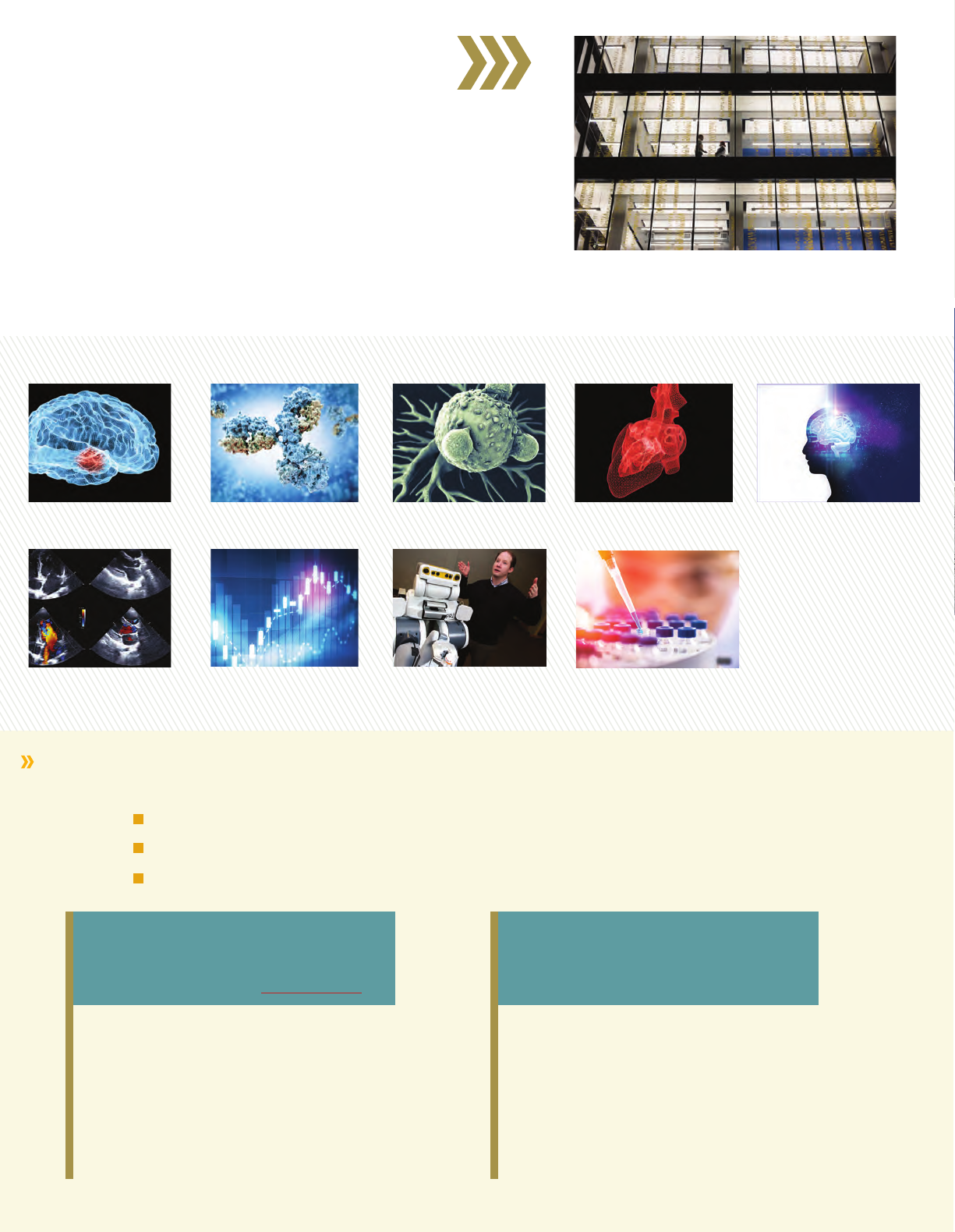
The biomedical engineering master’s program (MS BMED) is completed in three (non-thesis) to six (thesis) sequential semesters.
Candidates typically take two to four courses each semester.
Essy Behravesh, Ph.D.
Director of Student Services
Phone: 404.385.4254
CONTACT US TODAY TO FIND OUT
MORE ABOUT THIS MASTER’S PROGRAM.
The Wallace H. Coulter Department of Biomedical Engineering
is ranked among the best biomedical engineering programs
in the nation. Our students are doing cutting-edge research
in highly collaborative environments, which is a common
element of our team-driven culture. Our research laboratories
are dedicated to addressing unmet clinical challenges and
have access to superior resources only found in world-class
institutions. Students can pursue advanced studies in the
areas below.
BIOMEDICAL ENGINEERING
Francisco Robles, assistant professor, examines his latest laser conguration.
Robles’ research is improving imaging with advanced technologies.
Recruiting
Master of Biomedical Engineering
Candidates for this master’s program include:
Graduates who have earned a bachelor’s in
engineering, science, or math
Working career professionals with an
engineering and/or science background
Course of Study
Thesis Option
(21 hours coursework + 9 hours thesis)
Courses
Credit Hours
Bioscience ≥ 3
Engineering ≥ 3
Data science
≥ 3
Approved electives 6
Coursework total = 21
Applicants should have the following prerequisites:
• B.S. in engineering, science, or math
• One year (two semesters or three quarters) of
calculus-based physics
• Organic chemistry (one semester suggested)
• Calculus through and including differential
equations (4 semesters total)
• To prepare students for successful careers,
whatever their next step;
• To educate students in methods of advanced
analysis and appropriate problem solving;
• To provide a depth of knowledge in professionally
relevant biomedical engineering elds;
• To provide a breadth of knowledge that fosters
interdisciplinary approaches to problem solving;
• To develop the skills pertinent to the research
process, including working collaboratively and
communicating effectively;
• To prepare for transition to a Ph.D. program
if choosing a thesis option
Master of Biomedical Engineering at a Glance
Entry into the biomedical industry, or biomedical-
related research and development
Advancement towards a Ph.D., M.D., or M.D./Ph.D.
Target/refocus engineering talent towards the
biomedical engineering eld
Career Paths:
Course of Study
Non-thesis Option
(30 hours coursework)
Courses
Credit Hours
Bioscience ≥ 3
Engineering ≥ 3
Data science ≥ 3
Approved electives 9
Coursework total = 30
Cancer Technologies
Biomedical Informatics
and Systems Modeling
Neuroengineering
Biomedical Imaging
& Instrumentation
Immunoengineering
Biomedical Robotics
Cardiovascular
Engineering
Engineering
Education
Biomaterials and
Regenerative
Technologies
Coulter Department Research Areas
Bilal Haider, assistant professor, working with a graduate student.
Haider’s research is advancing neuroscience with new discoveries.
//////////////////////////////////////////////////////////////////////////////////////////////////////////////////////////////////////////////////////////////
///////////////////////////
///////////////////////////
Our program aims:
Atlanta Metropolitan Area Biotech Companies
4P Therapeutics
Aalto Scientic
Abeome
Acella Pharmaceuticals
Alimera Sciences
AngioDynamics
Antibodies Online
Arbor Pharmaceuticals
Aruna Biomedical
Athens Research and Technology
Atlantic Pharmaceuticals
AventaCell BioMedical
Avion Pharmaceuticals
Biome360
C.R. Bard
Cambium Medical Technologies
Carmel Biosciences
Carticept Medical
Celtaxsys
Clearside Biomedical
CONMED
CryoLife
Dune Medical Devices
Facet Medical Technologies
Genesis Biosciences
GeoVax
Halyard Health
HealPros
Health Discovery Corporation
Inhibikase Therapeutics
IQVIA
Lectenz Bio
Merial
Mikart
MiMedx
NeurOp
NeuroTrials Research
Noramco
Novartis
Osmotica Pharmaceutical
Pharma Tech Industries
ProPharma Group
QUE Oncology
Recro Gainesville
Respironics
Sanuwave
Sebacia
SJ Pharma
SpherIngenics
Stryker
Synexus
Theragenics
Vero Biotech
ViaCyte
WuXi Apptec
While the U.A. Whitaker Building is home to the Coulter Department,
the Roger A. and Helen B. Krone Engineered Biosystems Building
(pictured above) also houses BME faculty and laboratories.
Thesis option is oriented towards those contemplating pursuing a Ph.D. in the future.
Non-thesis option is oriented towards those seeking deeper content knowledge.
Course credits may transfer to the Ph.D. program (application required).
Pat Jordan
Graduate Program Manager
Phone: 404.385.3901
//////////////////////////////////////////////////////////////////////////////////////////////////////////////////////////////////////////////////////////////
///////////////////////////
All admission materials must be submitted via the
Georgia Tech graduate admission system.
February 1 is the application deadline for entry
in the fall semester.
September 1 is the application deadline for entry
in the spring semester.
Apply here: www.grad.gatech.edu
Once submitted, applications are reviewed by the
department’s faculty admissions committee.
Decisions are made on a rolling basis.
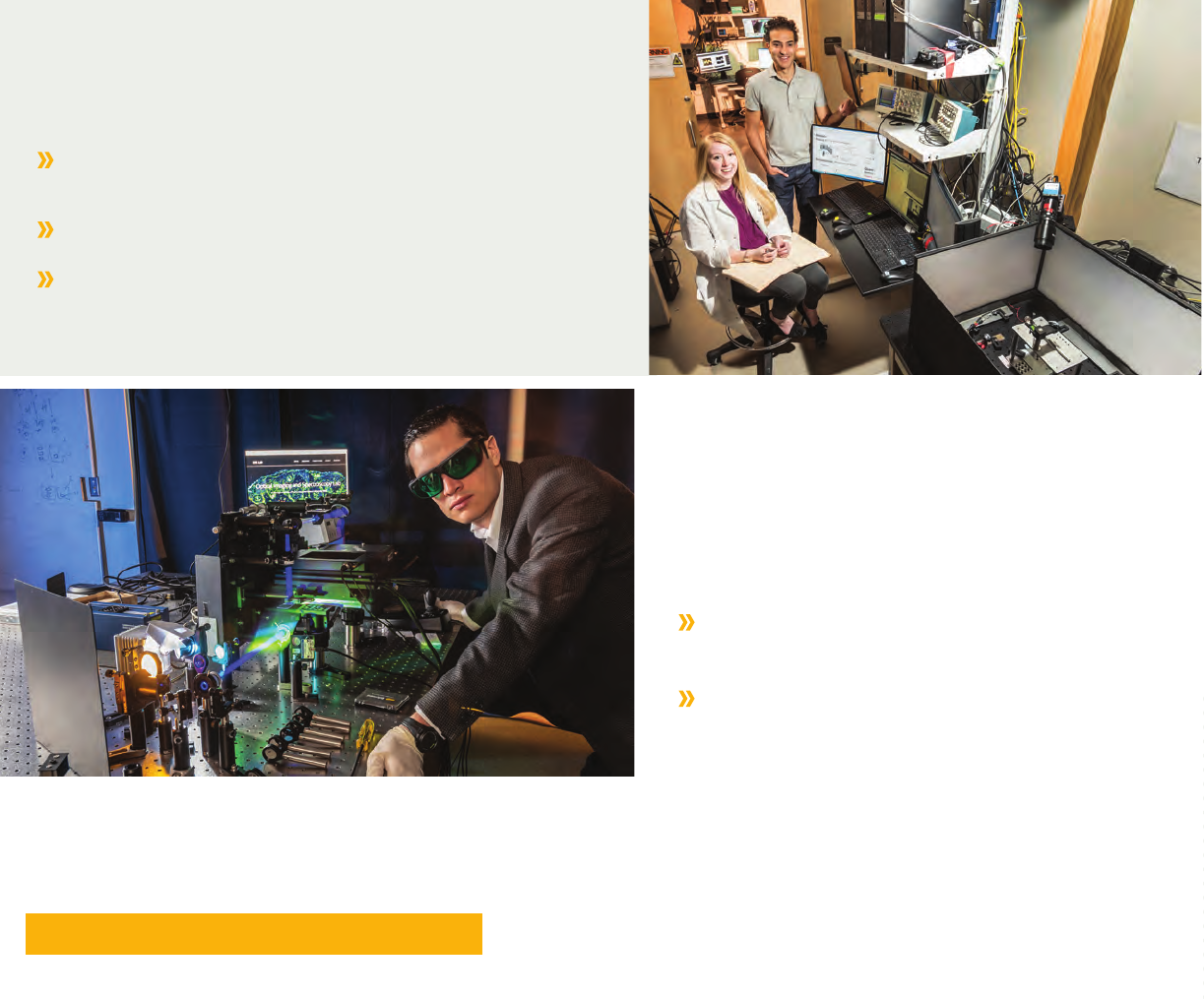
The biomedical engineering master’s program (MS BMED) is completed in three (non-thesis) to six (thesis) sequential semesters.
Candidates typically take two to four courses each semester.
Essy Behravesh, Ph.D.
Director of Student Services
Phone: 404.385.4254
CONTACT US TODAY TO FIND OUT
MORE ABOUT THIS MASTER’S PROGRAM.
The Wallace H. Coulter Department of Biomedical Engineering
is ranked among the best biomedical engineering programs
in the nation. Our students are doing cutting-edge research
in highly collaborative environments, which is a common
element of our team-driven culture. Our research laboratories
are dedicated to addressing unmet clinical challenges and
have access to superior resources only found in world-class
institutions. Students can pursue advanced studies in the
areas below.
BIOMEDICAL ENGINEERING
Francisco Robles, assistant professor, examines his latest laser conguration.
Robles’ research is improving imaging with advanced technologies.
Recruiting
Master of Biomedical Engineering
Candidates for this master’s program include:
Graduates who have earned a bachelor’s in
engineering, science, or math
Working career professionals with an
engineering and/or science background
Course of Study
Thesis Option
(21 hours coursework + 9 hours thesis)
Courses
Credit Hours
Bioscience ≥ 3
Engineering ≥ 3
Data science
≥ 3
Approved electives 6
Coursework total = 21
Applicants should have the following prerequisites:
• B.S. in engineering, science, or math
• One year (two semesters or three quarters) of
calculus-based physics
• Organic chemistry (one semester suggested)
• Calculus through and including differential
equations (4 semesters total)
• To prepare students for successful careers,
whatever their next step;
• To educate students in methods of advanced
analysis and appropriate problem solving;
• To provide a depth of knowledge in professionally
relevant biomedical engineering elds;
• To provide a breadth of knowledge that fosters
interdisciplinary approaches to problem solving;
• To develop the skills pertinent to the research
process, including working collaboratively and
communicating effectively;
• To prepare for transition to a Ph.D. program
if choosing a thesis option
Master of Biomedical Engineering at a Glance
Entry into the biomedical industry, or biomedical-
related research and development
Advancement towards a Ph.D., M.D., or M.D./Ph.D.
Target/refocus engineering talent towards the
biomedical engineering eld
Career Paths:
Course of Study
Non-thesis Option
(30 hours coursework)
Courses
Credit Hours
Bioscience ≥ 3
Engineering ≥ 3
Data science ≥ 3
Approved electives 9
Coursework total = 30
Cancer Technologies
Biomedical Informatics
and Systems Modeling
Neuroengineering
Biomedical Imaging
& Instrumentation
Immunoengineering
Biomedical Robotics
Cardiovascular
Engineering
Engineering
Education
Biomaterials and
Regenerative
Technologies
Coulter Department Research Areas
Bilal Haider, assistant professor, working with a graduate student.
Haider’s research is advancing neuroscience with new discoveries.
//////////////////////////////////////////////////////////////////////////////////////////////////////////////////////////////////////////////////////////////
///////////////////////////
///////////////////////////
Our program aims:
Atlanta Metropolitan Area Biotech Companies
4P Therapeutics
Aalto Scientic
Abeome
Acella Pharmaceuticals
Alimera Sciences
AngioDynamics
Antibodies Online
Arbor Pharmaceuticals
Aruna Biomedical
Athens Research and Technology
Atlantic Pharmaceuticals
AventaCell BioMedical
Avion Pharmaceuticals
Biome360
C.R. Bard
Cambium Medical Technologies
Carmel Biosciences
Carticept Medical
Celtaxsys
Clearside Biomedical
CONMED
CryoLife
Dune Medical Devices
Facet Medical Technologies
Genesis Biosciences
GeoVax
Halyard Health
HealPros
Health Discovery Corporation
Inhibikase Therapeutics
IQVIA
Lectenz Bio
Merial
Mikart
MiMedx
NeurOp
NeuroTrials Research
Noramco
Novartis
Osmotica Pharmaceutical
Pharma Tech Industries
ProPharma Group
QUE Oncology
Recro Gainesville
Respironics
Sanuwave
Sebacia
SJ Pharma
SpherIngenics
Stryker
Synexus
Theragenics
Vero Biotech
ViaCyte
WuXi Apptec
While the U.A. Whitaker Building is home to the Coulter Department,
the Roger A. and Helen B. Krone Engineered Biosystems Building
(pictured above) also houses BME faculty and laboratories.
Thesis option is oriented towards those contemplating pursuing a Ph.D. in the future.
Non-thesis option is oriented towards those seeking deeper content knowledge.
Course credits may transfer to the Ph.D. program (application required).
Pat Jordan
Graduate Program Manager
Phone: 404.385.3901
//////////////////////////////////////////////////////////////////////////////////////////////////////////////////////////////////////////////////////////////
///////////////////////////
All admission materials must be submitted via the
Georgia Tech graduate admission system.
February 1 is the application deadline for entry
in the fall semester.
September 1 is the application deadline for entry
in the spring semester.
Apply here: www.grad.gatech.edu
Once submitted, applications are reviewed by the
department’s faculty admissions committee.
Decisions are made on a rolling basis.

The biomedical engineering master’s program (MS BMED) is completed in three (non-thesis) to six (thesis) sequential semesters.
Candidates typically take two to four courses each semester.
Essy Behravesh, Ph.D.
Director of Student Services
Phone: 404.385.4254
CONTACT US TODAY TO FIND OUT
MORE ABOUT THIS MASTER’S PROGRAM.
The Wallace H. Coulter Department of Biomedical Engineering
is ranked among the best biomedical engineering programs
in the nation. Our students are doing cutting-edge research
in highly collaborative environments, which is a common
element of our team-driven culture. Our research laboratories
are dedicated to addressing unmet clinical challenges and
have access to superior resources only found in world-class
institutions. Students can pursue advanced studies in the
areas below.
BIOMEDICAL ENGINEERING
Francisco Robles, assistant professor, examines his latest laser conguration.
Robles’ research is improving imaging with advanced technologies.
Recruiting
Master of Biomedical Engineering
Candidates for this master’s program include:
Graduates who have earned a bachelor’s in
engineering, science, or math
Working career professionals with an
engineering and/or science background
Course of Study
Thesis Option
(21 hours coursework + 9 hours thesis)
Courses
Credit Hours
Bioscience ≥ 3
Engineering ≥ 3
Data science
≥ 3
Approved electives 6
Coursework total = 21
Applicants should have the following prerequisites:
• B.S. in engineering, science, or math
• One year (two semesters or three quarters) of
calculus-based physics
• Organic chemistry (one semester suggested)
• Calculus through and including differential
equations (4 semesters total)
• To prepare students for successful careers,
whatever their next step;
• To educate students in methods of advanced
analysis and appropriate problem solving;
• To provide a depth of knowledge in professionally
relevant biomedical engineering elds;
• To provide a breadth of knowledge that fosters
interdisciplinary approaches to problem solving;
• To develop the skills pertinent to the research
process, including working collaboratively and
communicating effectively;
• To prepare for transition to a Ph.D. program
if choosing a thesis option
Master of Biomedical Engineering at a Glance
Entry into the biomedical industry, or biomedical-
related research and development
Advancement towards a Ph.D., M.D., or M.D./Ph.D.
Target/refocus engineering talent towards the
biomedical engineering eld
Career Paths:
Course of Study
Non-thesis Option
(30 hours coursework)
Courses
Credit Hours
Bioscience ≥ 3
Engineering ≥ 3
Data science ≥ 3
Approved electives 9
Coursework total = 30
Cancer Technologies
Biomedical Informatics
and Systems Modeling
Neuroengineering
Biomedical Imaging
& Instrumentation
Immunoengineering
Biomedical Robotics
Cardiovascular
Engineering
Engineering
Education
Biomaterials and
Regenerative
Technologies
Coulter Department Research Areas
Bilal Haider, assistant professor, working with a graduate student.
Haider’s research is advancing neuroscience with new discoveries.
//////////////////////////////////////////////////////////////////////////////////////////////////////////////////////////////////////////////////////////////
///////////////////////////
///////////////////////////
Our program aims:
Atlanta Metropolitan Area Biotech Companies
4P Therapeutics
Aalto Scientic
Abeome
Acella Pharmaceuticals
Alimera Sciences
AngioDynamics
Antibodies Online
Arbor Pharmaceuticals
Aruna Biomedical
Athens Research and Technology
Atlantic Pharmaceuticals
AventaCell BioMedical
Avion Pharmaceuticals
Biome360
C.R. Bard
Cambium Medical Technologies
Carmel Biosciences
Carticept Medical
Celtaxsys
Clearside Biomedical
CONMED
CryoLife
Dune Medical Devices
Facet Medical Technologies
Genesis Biosciences
GeoVax
Halyard Health
HealPros
Health Discovery Corporation
Inhibikase Therapeutics
IQVIA
Lectenz Bio
Merial
Mikart
MiMedx
NeurOp
NeuroTrials Research
Noramco
Novartis
Osmotica Pharmaceutical
Pharma Tech Industries
ProPharma Group
QUE Oncology
Recro Gainesville
Respironics
Sanuwave
Sebacia
SJ Pharma
SpherIngenics
Stryker
Synexus
Theragenics
Vero Biotech
ViaCyte
WuXi Apptec
While the U.A. Whitaker Building is home to the Coulter Department,
the Roger A. and Helen B. Krone Engineered Biosystems Building
(pictured above) also houses BME faculty and laboratories.
Thesis option is oriented towards those contemplating pursuing a Ph.D. in the future.
Non-thesis option is oriented towards those seeking deeper content knowledge.
Course credits may transfer to the Ph.D. program (application required).
Pat Jordan
Graduate Program Manager
Phone: 404.385.3901
//////////////////////////////////////////////////////////////////////////////////////////////////////////////////////////////////////////////////////////////
///////////////////////////
All admission materials must be submitted via the
Georgia Tech graduate admission system.
February 1 is the application deadline for entry
in the fall semester.
September 1 is the application deadline for entry
in the spring semester.
Apply here: www.grad.gatech.edu
Once submitted, applications are reviewed by the
department’s faculty admissions committee.
Decisions are made on a rolling basis.
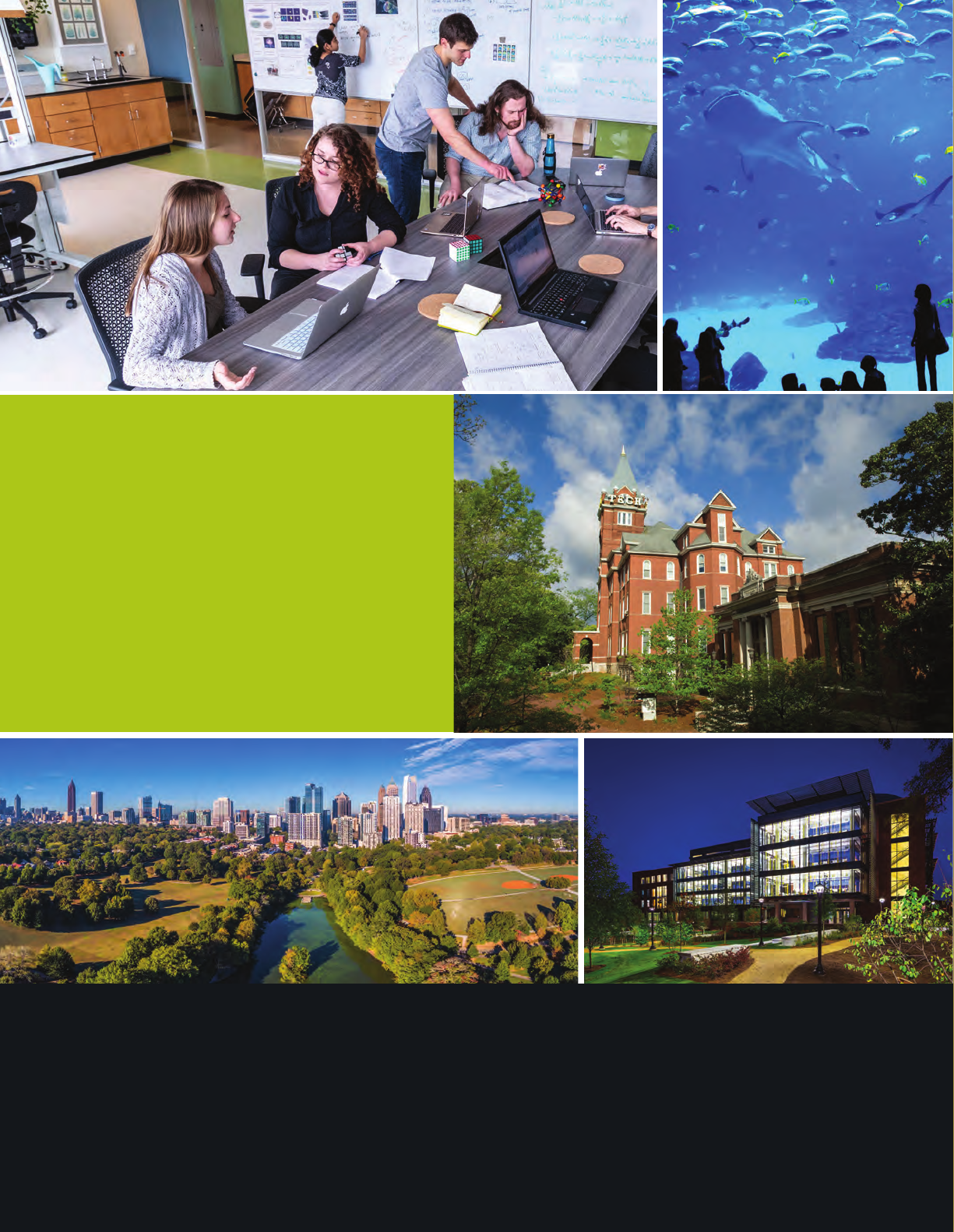
Recyclable
This publication is printed on paper that is produced
with recycled material. Georgia Tech is committed to
Copyright 2019 • Georgia Institute of Technology
MASTER OF
BIOMEDICAL ENGINEERING
Georgia Institute of Technology
BME Academic Oce
313 Ferst Drive, 1st Floor
Atlanta, Georgia 30332
www.bme.gatech.edu
•
Located in one of America’s most vibrant cities, Georgia Tech’s College of Engineering combines the
resources of a major university with the benets of an urban campus, giving students the tools they need
to chase their ambitions. With dozens of degree programs across eight schools, the College has built a
strong reputation in the United States and abroad, and graduates leave with skills, knowledge, and global
savvy for a world increasingly dependent on engineering.
Georgia Tech’s engineering graduate programs are consistently ranked in the top ten in the nation in their
respective specialties according to U.S. News & World Report graduate rankings of national universities
granting doctoral degrees.
The Wallace H. Coulter Department of Biomedical Engineering
at Georgia Tech and Emory University arms our institutions’
eorts to increase equity, diversity, and inclusion on our
campuses. We strive to create a welcoming, diverse and
inclusive environment that values, celebrates, and respects the
individual and communal dierences that make us human, and
aspire to cultivate global leaders in engineering and medicine
who are champions of inclusive excellence.
ATLANTA: A Thriving Metropolis
Atlanta is an integral and exciting aspect of the Georgia
Tech and Emory educational experience. Atlanta
is one of the Southeast’s most vibrant, progressive,
and dynamic cities. When students are not studying,
they explore Atlanta’s rich and diverse culture
through museums, music venues, professional sports
teams, shopping districts, and the best cuisine in the
south. Atlanta’s warm climate allows for year-round
outdoor activities. Mountains, lakes, campsites, and
hiking trails are all within an hour’s drive — and access
to Hartseld-Jackson Atlanta International Airport
makes the whole world just a ight away.
Located in Atlanta, the
Georgia Aquarium is the
world’s largest indoor
aquarium.
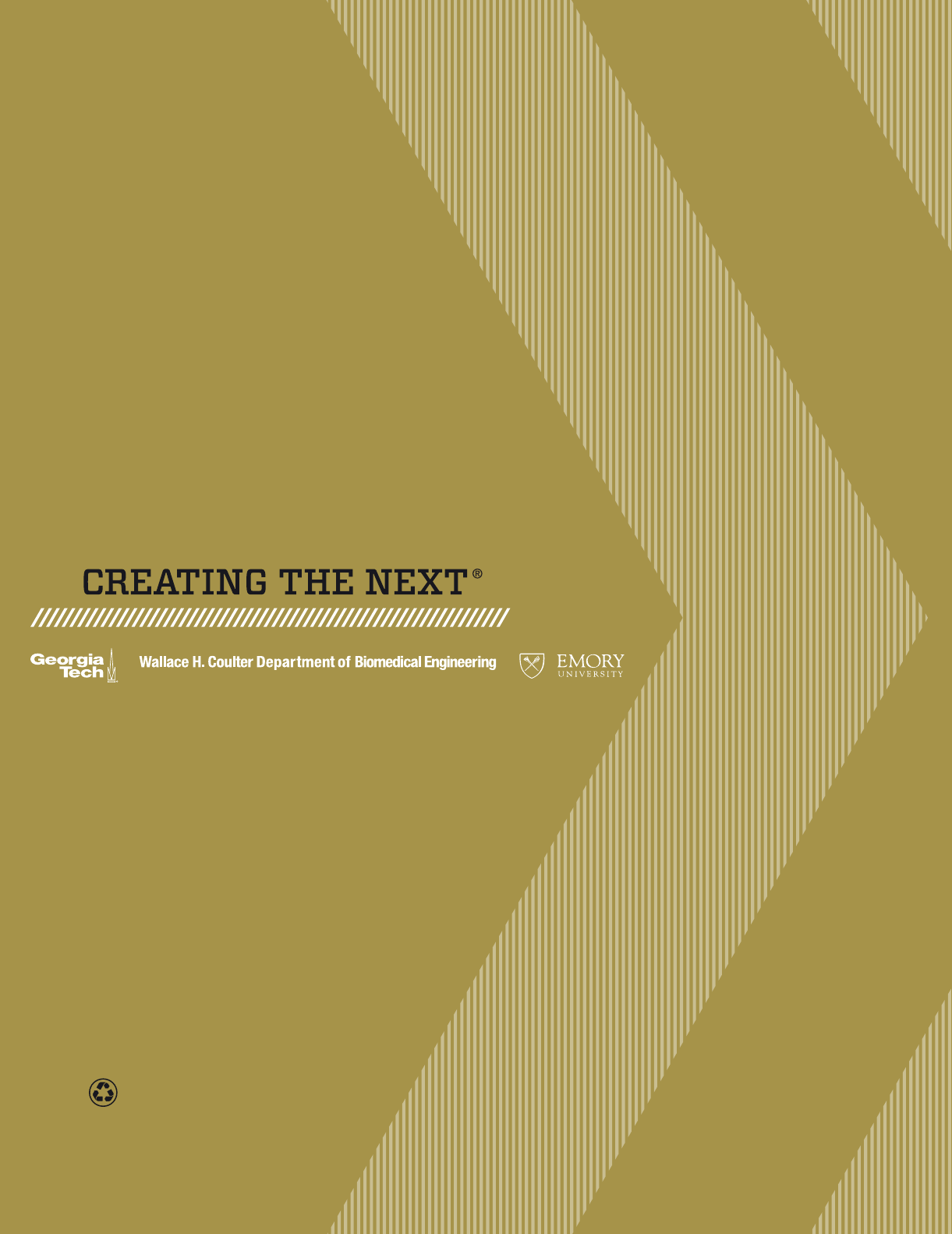
Recyclable
This publication is printed on paper that is produced
with recycled material. Georgia Tech is committed to
Copyright 2019 • Georgia Institute of Technology
MASTER OF
BIOMEDICAL ENGINEERING
Georgia Institute of Technology
BME Academic Oce
313 Ferst Drive, 1st Floor
Atlanta, Georgia 30332
www.bme.gatech.edu
•
Located in one of America’s most vibrant cities, Georgia Tech’s College of Engineering combines the
resources of a major university with the benets of an urban campus, giving students the tools they need
to chase their ambitions. With dozens of degree programs across eight schools, the College has built a
strong reputation in the United States and abroad, and graduates leave with skills, knowledge, and global
savvy for a world increasingly dependent on engineering.
Georgia Tech’s engineering graduate programs are consistently ranked in the top ten in the nation in their
respective specialties according to U.S. News & World Report graduate rankings of national universities
granting doctoral degrees.
The Wallace H. Coulter Department of Biomedical Engineering
at Georgia Tech and Emory University arms our institutions’
eorts to increase equity, diversity, and inclusion on our
campuses. We strive to create a welcoming, diverse and
inclusive environment that values, celebrates, and respects the
individual and communal dierences that make us human, and
aspire to cultivate global leaders in engineering and medicine
who are champions of inclusive excellence.
ATLANTA: A Thriving Metropolis
Atlanta is an integral and exciting aspect of the Georgia
Tech and Emory educational experience. Atlanta
is one of the Southeast’s most vibrant, progressive,
and dynamic cities. When students are not studying,
they explore Atlanta’s rich and diverse culture
through museums, music venues, professional sports
teams, shopping districts, and the best cuisine in the
south. Atlanta’s warm climate allows for year-round
outdoor activities. Mountains, lakes, campsites, and
hiking trails are all within an hour’s drive — and access
to Hartseld-Jackson Atlanta International Airport
makes the whole world just a ight away.
Located in Atlanta, the
Georgia Aquarium is the
world’s largest indoor
aquarium.
